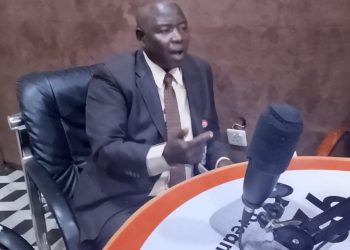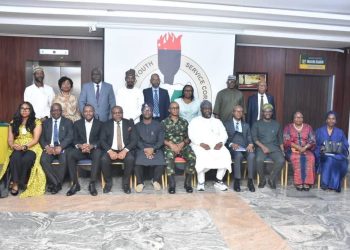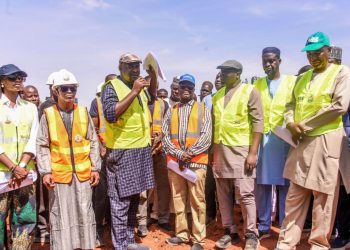…NSA, EU, Traditional Rulers, Civil Society and Private Sector Pledge Support
By Nkechi Eze
Nigeria has taken another decisive step in strengthening its non-kinetic approach to national security with the validation of the revised Policy Framework and National Action Plan for Preventing and Countering Violent Extremism (PCVE), at a two-day workshop hosted by the National Counter Terrorism Centre (NCTC), Office of the National Security Adviser (ONSA), in Abuja.
Declaring the workshop open on behalf of the National Security Adviser, Mallam Nuhu Ribadu, the National Coordinator of the NCTC, Maj.-Gen. Adamu Laka, welcomed a wide spectrum of stakeholders drawn from Ministries, Departments and Agencies, the Armed Forces, security and intelligence services, civil society, academia, development partners, the international community, traditional and religious leaders, community representatives and youth groups.
“The presence of such a broad coalition demonstrates our shared commitment to confronting violent extremism through inclusive and sustainable approaches,” Maj.-Gen. Laka said. He singled out Hedayah International Center of Excellence for Countering Violent Extremism for its “invaluable partnership and technical support,” noting that the review process had been enriched by global expertise and aligned with international best practices.
Tracing Nigeria’s journey since the original framework was launched in 2017, the NCTC Coordinator highlighted progress in early warning mechanisms, community engagement, youth empowerment, gender inclusion, civic education, counter-narratives, and partnerships with civil society. Yet, he stressed that the revised framework must be more than a document: “This is not simply a review exercise, but an endorsement of a shared vision that will guide our PCVE efforts in the years ahead. Our task is to ensure that every section of this framework is clear, realistic, implementable, and reflective of our national priorities.”
Acknowledging the evolving threat landscape shaped by socio-economic inequalities, online radicalization, climate-related pressures and the misuse of emerging technologies, he added: “Nigeria has long recognized that terrorism cannot be defeated by military action alone. Lasting peace requires addressing root causes, building resilient communities, and amplifying credible voices that promote unity and tolerance.”
Speaking on behalf of the European Union, Ambassador of the EU Delegation to Nigeria His Excellency, Mr Gautier Mignot commended Nigeria’s commitment to inclusive counter-terrorism strategies. He noted that the EU’s support through the STRIVE Global Programme implemented in partnership with Hedayah International Center of Excellence for countering extremism and violent extremism was part of broader efforts to strengthen resilience to violent extremism.
“The terrorist threat is a particularly complex one, requiring a ‘whole-of-government’ and even a ‘whole-of-society’ approach,” the EU Ambassador said. “This is why the overall counter-terrorism strategy and the revised framework on PCVE are essential tools. Prevention is just as important as response, and that includes livelihood opportunities, skills development and respect for fundamental rights. Insurgents are quick to exploit any breach of citizens’ rights; protecting those rights is therefore central to building trust with communities.”
He emphasized the need to domesticate the framework at the state level and deepen government presence in rural areas to counter marginalization. “To conquer the hearts and minds of the people, government must show professionalism and fairness. That is how to build true resilience against extremist recruitment,” he said.
Representing the traditional institution, the Emir of Kaura Namoda, Maj. Sanusi Kaura (rtd.), underscored the vital role of royal fathers in mobilizing communities. “Traditional rulers have been closely engaged in the design and implementation of the existing PCVE framework, and we have equally been involved in the review process that brings us here today,” he said. “This inclusivity is commendable, as it ensures that the voices of communities most affected by violent extremism are heard. We remain ready to mobilize our people, promote peace, and reinforce community-based solutions in line with this framework.”
From the private sector, Tochukwu Ifemene of Mischom Citizenship Initiative for Africa pledged continued collaboration, noting that business actors recognize their social responsibility in strengthening peace and security. “We have trust in this process and will continue to support dialogue, contribute our corporate social responsibility, and work with stakeholders to ensure this framework delivers results,” he said.
Civil society voices were also strongly represented. Veteran activist Jaye Gaskiya stressed the need for practical implementation. “Any strategy that is not implementable is not a strategy,” he warned. “This time, we must ensure the framework is grounded in action and delivers tangible results for communities. We will stand by it and make sure it succeeds.”
The workshop provided a platform for collective scrutiny of the revised policy, with participants emphasizing human rights, gender and youth engagement, monitoring and accountability, and non-kinetic solutions such as education, dialogue, early intervention and counter-narratives.
With commitments from government, international partners, traditional leaders, the private sector and civil society, stakeholders described the revised PCVE framework as a whole-of-society call to action that could help Nigeria build peace and resilience against the evolving threat of violent extremism.

















